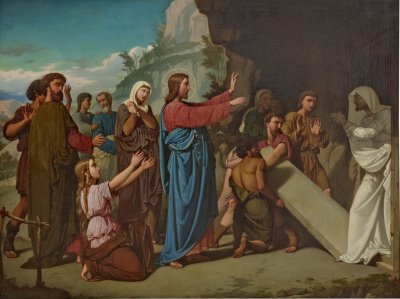Weekly Lenten Meditations
Week 5
As the Lenten cycle moves into Holy Week, we prepare to recall in prayer and in liturgical celebration the extraordinary love of God revealed in Christ’s death and resurrection. The sacred days of Holy Week carry us through a kind of annual retreat into the heart of our Christian faith so that the Holy Spirit might renew and deepen the grace of our Baptism. The Church’s liturgies help us to enter ever more consciously into the beauty and wonder of our redemption in Christ, crucified and risen.
On the threshold of the solemn remembrance of Jesus’ passion, death, and resurrection, the Church holds up for us the figure of Lazarus, Jesus’ close friend.  Recalling the miracle of Christ’s raising Lazarus from the tomb and declaring the astounding words, “untie him and let him go free,” would certainly encourage us in the promise of eternal life through the power of God’s unrelenting love for us. We ought to be consoled by the image of Jesus’ love for Lazarus and for his sisters, movingly displayed through Jesus’ tears for the one he loved. And we can imagine the joy of Lazarus stepping out of the tomb at the sound of his name and beholding Jesus’ tear-stained eyes welcoming him back, not to mention the unbounded joy of Martha and Mary at having their brother returned to them. It is a happy ending beyond what could ever have been foreseen.
Recalling the miracle of Christ’s raising Lazarus from the tomb and declaring the astounding words, “untie him and let him go free,” would certainly encourage us in the promise of eternal life through the power of God’s unrelenting love for us. We ought to be consoled by the image of Jesus’ love for Lazarus and for his sisters, movingly displayed through Jesus’ tears for the one he loved. And we can imagine the joy of Lazarus stepping out of the tomb at the sound of his name and beholding Jesus’ tear-stained eyes welcoming him back, not to mention the unbounded joy of Martha and Mary at having their brother returned to them. It is a happy ending beyond what could ever have been foreseen.
Two elements of this scene give us pause for deeper reflection. First, Jesus did not just restore Lazarus from the grave; Jesus took his place. When Jesus announced to his disciples that they were returning to Judea, the disciples offered a despondent reply, “Rabbi, the Jews were just trying to stone you, and you want to go back there?” Farther along in the narrative Jesus informed his disciples that Lazarus had died, at which Thomas remarked, “Let us also go to die with him.” Jesus’ return to Judea was no mere act of compassion for his friend. Jesus consciously exposed himself to mortal danger. In entering Judea at this point, Jesus chose and embraced his own death. Through the dialogue in the gospel, the evangelist clearly relates Jesus’ decision to go to Lazarus with Jesus’ acceptance of the Cross. In the gospel, they are stages or moments in a single story, both informing the other. Jesus’ love for his friend Lazarus moved him to offer his life so that Lazarus might live. Of course, you and I are Lazarus. The fourth gospel makes clear that in the crucifixion Jesus would die for love of us. Jesus surrendered himself so that we could be freed from the tomb of sin and death.
The second element worth contemplating is Jesus’ delay in going to Lazarus when Jesus knew his friend was gravely ill. Jesus, it seems, permitted Lazarus to die. We can imagine that Martha and Mary sent word to Jesus about Lazarus’ condition because they believed both that Jesus cared for them, and that he could heal their dying brother. Jesus had certainly worked many miracles prior to this moment in the gospel, and the stories of his signs had drawn much attention. Perhaps as Lazarus felt his body weakening, he asked whether Jesus had come. Perhaps Martha and Mary anxiously looked down the road several times a day wondering when Jesus would answer their request and save the one he loved from slipping away. Maybe Lazarus died wondering whether Jesus had received the message or whether Jesus simply didn’t want to help him as he had rescued others. We do not know what crossed Lazarus’ mind, or his sisters’, but all that the gospel shares in this regard is Jesus’ apparent silence. Help did not arrive and death claimed Lazarus. Lazarus did not likely anticipate how the glory of God would be made manifest through him, specifically through his death. However, you and I live in the knowledge of the Easter victory. We carry the faith that death is no longer an end, but a transition. The raising of Lazarus invites us to pray for the gift of greater faith—when we face the moment of death, however death overtakes us, will we have the serenity of heart to believe that Jesus will come to our grave with eyes full of love, to awaken us to eternal life? We do not ultimately determine the manner of our passing, and for many people it is a gradual, painful process that is not easy to bear. A that moment it may appear that God is absent or unresponsive, yet He assures us that His glory will be revealed, in us, as well as Lazarus. If God invites us to such trust and abandonment at the moment of our final breath, perhaps He asks the same trust in the other sufferings and losses that we experience through life, where God seems silent—a resurrection is coming, “I will prove my faithful love once again.”
As we are about to enter Holy Week, let’s pray for deepening faith, that in the darkest moments we face we might hold fast to the truth that the heart of Jesus burns with love for us personally, by name, and that he will surely cover us in glory. Holy Week is the testament through which Jesus guarantees that his promise will be fulfilled. He has already taken our place in the tomb so that we can have his place with the Father.
 Meditation written by Fr. James Rafferty
Meditation written by Fr. James Rafferty